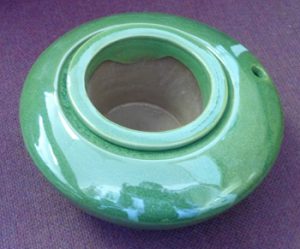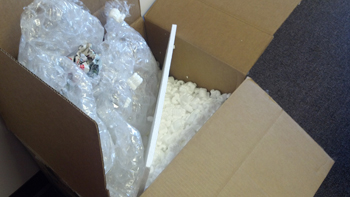If you’ve been reading this blog for a while, you know that I care a lot about how it feels to work in my office. (See The Pleasures of the Office.) My extensive collection of plants adds to my work satisfaction.
I needed some self-watering pots for African violets and located four beauties online — asymmetrical and with a green glaze that complements the color of the African violets’ leaves. The pots were on sale, so the value was very good — and I felt like a smart and accomplished shopper for finding them.
A Hole in One or More
 African violet pots have an outer pot that acts as a reservoir, into which is inserted a smaller, only partially glazed pot that absorbs water slowly through its unfinished walls. When the pots arrived, I was excited to see a special feature I hadn’t noticed in the photos when I placed the order. Near the edge on the top of each outer pot is a small hole for inserting the spout of a watering can, so you can add water without having to lift out the inner pot and risk dripping and mess. The clever design was an added bonus, and made me feel like an even more skillful shopper.
African violet pots have an outer pot that acts as a reservoir, into which is inserted a smaller, only partially glazed pot that absorbs water slowly through its unfinished walls. When the pots arrived, I was excited to see a special feature I hadn’t noticed in the photos when I placed the order. Near the edge on the top of each outer pot is a small hole for inserting the spout of a watering can, so you can add water without having to lift out the inner pot and risk dripping and mess. The clever design was an added bonus, and made me feel like an even more skillful shopper.
 But the packaging — well, that made me feel downright dumb. The cardboard shipping box was sturdy and marked with the company’s name and logo. But not only were the pots swathed in multiple layers of bubble wrap, and buried in those dreaded plastic peanuts that cling to everything and have to be taken to special locations for recycling, there were actual sheets of Styrofoam — an old-fashioned packing material that has long been out of favor and for which many alternatives exist. It’s remarkable that a business that sells such wonderful pots could also use such ecologically unsound — and undesirable — packing material.
But the packaging — well, that made me feel downright dumb. The cardboard shipping box was sturdy and marked with the company’s name and logo. But not only were the pots swathed in multiple layers of bubble wrap, and buried in those dreaded plastic peanuts that cling to everything and have to be taken to special locations for recycling, there were actual sheets of Styrofoam — an old-fashioned packing material that has long been out of favor and for which many alternatives exist. It’s remarkable that a business that sells such wonderful pots could also use such ecologically unsound — and undesirable — packing material.
Thinking Very Far Inside the Box
What’s a caring customer to do? As a smart shopper, I’d like to order additional pots from this company, and not just for African violets. But patronizing a firm whose shipping practices are from the early 1980s would make me an irresponsible shopper. Do I need to do the work of trying to educate this company so I can buy more products from it?
Why would a company put its customers in this awkward position? A satisfactory customer experience comprises many aspects or touchpoints, ranging from promotional appeal, product quality, to ease of transaction to delivery, and billing. Your company isn’t doing anything like this, is it?
Onward and upward,
LK


I love this post, Liz!
A couple of thoughts come to mind.
Could it be that the company is actually recycling those ecologically out-moded styrofoam sheets? Perhaps they have several warehouses full of the stuff, so rather than dump it, they are using it. I guess it would be worthwhile asking them, which brings me to my next point. Contacting the company re. their environmental practices.
Finally, here’s a question I once posed: http://biznik.com/forums/business-advice/topics/going-out-on-a-limb-recycling
I may even look at reintroducing African violets at home – the poor things had feet that were too wet. 🙂
Marianna, you are truly an optimist. It’s possible (but unlikely) that the company is reusing or repurposing those nasty Styrofoam sheets, and even the peanuts too. If they are, they should be prodding their suppliers to switch to more ecologically sound options. And if they’re trying to be efficient by not wasting — to my mind it would more efficient to recycle the lot of it commercially, instead of hoping that each individual customer who receives this packaging will take the necessary pains to do it.
Contacting the company to find out what’s really going on (and their true intent) is an excellent idea. Either way, though, I object to the idea of any company obligating its customers to do extra work unless “shared work” is actually part of its offer promise.
On the plus side, I’m glad to hear you’re reconsidering African violets. They’re so lovely — and these pots actually reduce the customer’s work!
Yes, I am, but with a dose of skepticism thrown in. One of the things I work on is asking questions before zooming to assume. (http://changeofheartstresssolutions.blogspot.ca/2009/09/zoom-to-assume.html)
We love those short-cuts, don’t we? 🙂
I agree that it is maddening when you buy anything from a bottle of aspirin to face-cream to something technology-related and more often than not, the packaging is much larger than necessary. I often wonder why there isn’t more stringent rules pertaining to this. The first R is reduce, after all. (Here is where my skepticism enters in, but then that’s a whole other topic of conversation!)
I love your posts, Liz!